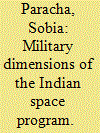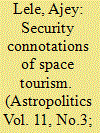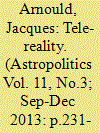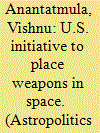| Srl | Item |
| 1 |
ID:
124930


|
|
|
|
|
| Publication |
2013.
|
| Summary/Abstract |
A standard microeconomic tool is used to analyze quantitative data to reveal the attitudes of European states toward space exploration and exploitation. The contemporary economic crisis uncovers the real political priorities. The tool used helps us to distinguish between three policy types: activist, active, and passive. Words can radically differ from real actions of governments, as is shown in this article. Results indicate that there is a relatively strong core of supporting states of space exploration and exploitation in the middle of the European continent.
|
|
|
|
|
|
|
|
|
|
|
|
|
|
|
|
| 2 |
ID:
124929


|
|
|
|
|
| Publication |
2013.
|
| Summary/Abstract |
The public is generally supportive of space policy, but less supportive of spending for the National Aeronautics and Space Administration (NASA) compared to other government programs. Previous research has helped identify who is more likely to be supportive of NASA spending, but not why. This study seeks to understand the causal mechanisms that influence support for NASA. Using natural between-survey and induced within-survey experiments, this study attempts to identify factors influencing changes in public support for NASA spending. Short-term programmatic and related media effects appear to have no influence on public support for NASA spending. However, correcting information asymmetries in regard to NASA's budget appears to have a significant positive effect on public support for NASA spending. The findings speak to the importance of the public being well informed on policy issues in order to make a correct policy choice, and demonstrate that individual programmatic aspects may not be as important as overall agency direction.
|
|
|
|
|
|
|
|
|
|
|
|
|
|
|
|
| 3 |
ID:
124928


|
|
|
|
|
| Publication |
2013.
|
| Summary/Abstract |
The Indian space program is increasingly militarized. A clear policy shift in this direction has taken place. The transformation is happening because of international cooperation, especially in the civilian domain. In order to get foreign support, India projects the civilian image of its space program by arguing that there are bureaucratic and organizational barriers between civil and military programs that control internal diversion. At the same time, there exists evidence of civilian technology acquired through foreign sources being diverted for military use.
|
|
|
|
|
|
|
|
|
|
|
|
|
|
|
|
| 4 |
ID:
124932


|
|
|
|
|
| Publication |
2013.
|
| Summary/Abstract |
This article links the prospects of growth in space tourism to the defense preparedness of the state. It is argued that any significant developments in space tourism attract the attention of strategic planners to check the feasibility of using the transportation platforms that support tourism for strategic purposes. It is likely that the way developments in rail, air, and maritime transportation revolutionized the method of warfighting, developments in the space travel sector will make their impact on warfare in the near future.
|
|
|
|
|
|
|
|
|
|
|
|
|
|
|
|
| 5 |
ID:
124933


|
|
|
|
|
| Publication |
2013.
|
| Summary/Abstract |
With the introduction and development of space techniques, three types of remote reality, or tele-reality, have emerged: (1) the Earth, its environments, and its inhabitants have been brought closer to each of us; (2) the planets in the solar system are now "at hand's reach"-a robotic hand, that is; and (3) deep space is brought to our screens in three dimensions. But remote reality raises questions: What connection does it make between the perceptible and the intelligible; and what confusion does it maintain between what is real and what appears on the screen? New practices are challenging the way we handle the relationship between seeing, knowledge, and power, and questioning our ethical values. It is time and essential that we redefine the conditions and boundaries of our "tele-techniques."
|
|
|
|
|
|
|
|
|
|
|
|
|
|
|
|
| 6 |
ID:
124926


|
|
|
|
|
| Publication |
2013.
|
| Summary/Abstract |
The United States must ensure sustainability and stability in space by protecting its satellites to safeguard national security and economic vitality. Concerns for obtaining this security are mounting, as U.S. satellites are increasingly vulnerable to developing threats from adversaries. This article proposes that the United States will eventually initiate the weaponization of space to defend its space systems and supporting infrastructure. The consequence for such an initiative will manifest a pronounced counteraction from China and Russia, the key spacefaring adversaries of the United States. Such a counteraction will consist of a space-based arms race, as each nation will jockey to position itself as the dominant power in space.
|
|
|
|
|
|
|
|
|
|
|
|
|
|
|
|